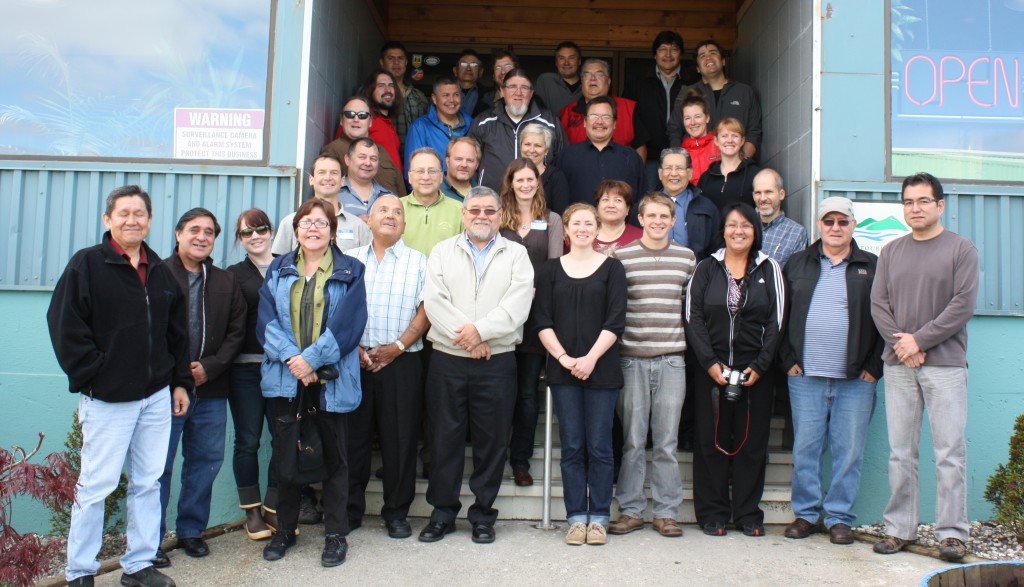Last month organizers from the Alaska Conservation Foundation, The Nature Conservancy, EcoTrust Canada, and Tides Canada brought together community leaders and natural resource management practitioners from communities in Alaska, coastal British Columbia, and Washington.
Recognizing that natural systems do not acknowledge political borders and that informed management of our shared coastline ecosystem requires open communication and collaboration, these groups came together in Prince Rupert, BC with the goals of sharing economic development and capacity building strategies and their relationship to stewardship, building stronger relationships and understanding between regional communities, sharing innovative governance, training, and monitoring strategies and tools, and exploring the desire and developing a plan for continue collaboration and communication throughout the region.
Several presentations were given by community practitioners working toward community based watershed management and sustainable community development from Washington up the coast to British Columbia and Southeast Alaska.
Prince Rupert City Councillor, Joy Thorkelson spoke on the development of the Sustainable Marine Fisheries and Communities Alliance, or SMFCA. This alliance supports communities in BC working toward local control of fisheries resources. SMFCA developed a strategic plan to help local fishermen build economy, creating and retaining wealth in the local economy, supporting the introduction of a younger workforce to the fishing industry, promoting job creation in community-based fisheries monitoring, resisting industry privatization, and bringing communities together to share resources and discuss fair fisheries management.
Harvey Humchitt of the Heiltsuk Integrated Resource Management Department in Bella Bella, BC, Charles Peele of the Hydaburg Cooperative Association, and Ed Johnstone of the Quinault Indian Nation in Washington presented community based watershed management efforts in their home communities.
Humchitt spoke of partnerships with British Columbia university programs working to find solutions to community concerns over the impacts of climate change and monitoring for an invasive green crab species competing for habitat and resources with their native shellfish.
Charles Peele spoke on the HCA’s Hetta Lake Salmon Assessment Project, in which the Hydaburg community made a collective effort to reduce their subsistence harvest of fish and monitor stocks and habitat to ensure the return of a healthy sockeye population (read more about this project here).
Johnstone spoke of the Quinault community’s efforts to monitor and maintain the natural resources that are so vital to their culture and way of life to ensure that these resources area available for the future generations inheriting their ancestral lands.
These presentations and the interactions amongst gathering participants sparked conversations and group discussions around the range of important issues impacting coastal communities that depend upon the many resources provided by the temperate rainforest that spans the entire region.
- Coastal BC communities expressed great concern over proposed Enbridge Pipeline plans, fearing the damage it could cause to critical salmon spawning habitat, as well as the threats posed by large tanker traffic transporting oil along the marine passageways that connect these coastal communities. Concerns expressed reflected back on the devastation caused by the 1989 Exxon Valdez oil tanker spill that released 11 million gallons of crude oil across 1,300 miles of Alaska coastline. Representatives from coastal communities from Alaska, BC, and Washington agreed that a spill of this magnitude would devastate the coastal rainforest environment shared across political borders and could greatly impact the critical natural resources depended up on by all communities. Concerns over other trans-boundary mining efforts in the region were also discussed.
- Cross-border concerns voiced also included threats posed by invasive aquatic and terrestrial vegetation and wildlife species, as well as the introduction of viruses and diseases from farmed salmon to wild salmon populations along the coast. Many communities also discussed concerns over the impacts of climate change and tsunami debris affecting their coastlines.
Communities from Canada and the US discussed and shared strategies, successes, and challenges faced in collaborating with larger agencies and using their voice as a community to impact government policy and natural resource management. BC and US representatives shared the programs and organizations currently in place to support community based resource monitoring and sustainable development of the coastal fishing industry.
Through shared meals of traditional regional foods, presentations, small and large group discussions, and personal conversations, participants in the gathering came to know each other and recognize the deep connection to place that was shared amongst members of these coastal communities that depend upon and wish to protect the natural resources that make them so unique.
At the close of the gathering, the group discussed action steps to advance these conversations forward and build on the collaborative momentum established at the meeting. Proposed actions included future gatherings to include BC and US Legislative members as well as community youth to discuss and voice coastal community concerns over proposed large resource extraction, BC communities working with Alaska communities to communicate issues and inform community members to mobilize as an organized, united voice, and standing in solidarity against the issues that impact these communities sharing one coastline across political borders.
A list of existing networks supporting community based natural resource management, sustainable community development, and cross-boundary communication was generated as a resource to support the development of these proposed actions. You can access this list of networks here:
[button url=”http://alaskawatershedcoalition.org/wp-content/uploads/2013/06/TBG-existing-networks-list.docx” color=”blue” width=”threequarter” ]Trans-Boundary Networks List[/button]
Thank you to all who organized, facilitated, participated in, and prepared food for this gathering.

